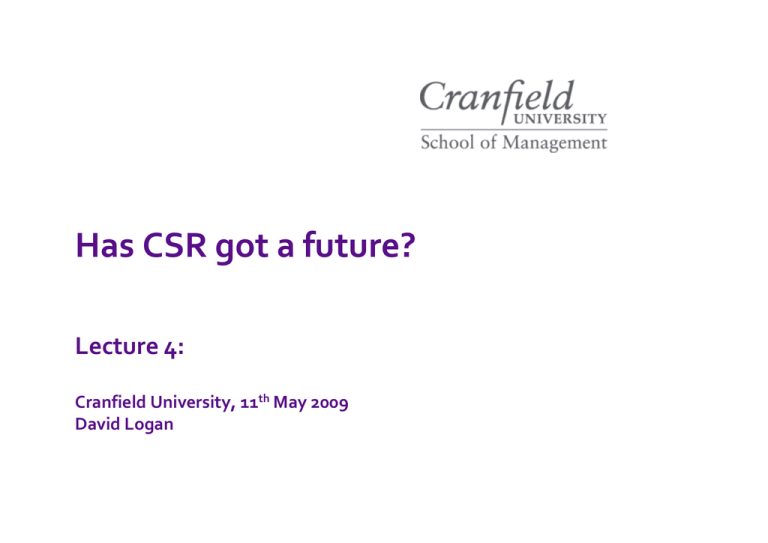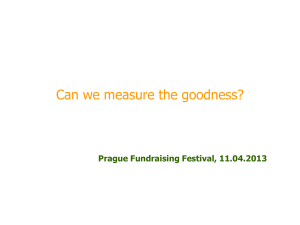Has CSR got a future? Lecture 4: Cranfield University, 11 May 2009
advertisement

Has CSR got a future? Lecture 4: Cranfield University, 11th May 2009 David Logan Structure of presentation 1. Introduction 2. The scope of CSR 3. Some strategic challenges 4. Some management challenges 5. Implications for management education 1 Introduction Has CSR got a future? Yes indeed!! It is about the responsible use of corporate power Most multinationals are larger than small countries cash people Business has choices about its impacts on the world Questions are What kind of world is it operating in? What is the responsible choice? 2 Introduction Global society by sector ‐ USA Government 34% For‐profit 60% Not‐for‐profit 6% Informal 3 Introduction Global society by sector ‐ India Government 28.7% For‐profit 69% Not‐for‐profit 1.3% Informal 4 Introduction Global inter‐dependence is here to stay A globalised economy financial exchanges supply chains and markets labour The ‘creative destruction’ of capitalism and trade cycles continues Concern for inter‐generational impacts CO2 / obesity / migration Emergence of global values? Universal Declaration of Human Rights democracy NGOs Emergence of global transparency internet mobiles 5 The scope of CSR – three components Sustainability Taxes Economic Emissions Environment Wages Recycling Social Diversity 6 The scope of CSR – the whole value chain Backward linkages The company Social responsibility Equal opportunities in recruitment Child labour / Pay / Conditions / Safety Quality control Raw materials eg cocoa / quinine Forward linkages Traceability / Safe handling Advertising to children Manufacturing Manufactured goods and services Quality control / other policies e.g. HR & community involvement Retailers Consumers Environmental responsibility Sustainable resources / Pesticides / Compliance with law in factories Resource use, emissions and recycling Refrigeration Recycling containers 7 Ref: The Corporate Citizenship Company The scope of CSR ‐ The total sustainability footprint Long‐term Impacts 5. e.g. consumer health and well being and CO2 4. Consumer footprint Product/Brand 1 Minor products & brands 2. Backward linkages Raw material, manufactured goods and service suppliers 3. Forward linkages 1. Owned & operated business + co‐ packers & contractors Product/Brand 2 Pathways to market: Product/Brand • Wholesalers 3 • Retailers • Advertisers Product/Brand 4 Product/Brand 5 Product/Brand 6 Some strategic challenges 1. Market failure can overwhelm good corporate citizens Lord Turner said: “A global market economy remains the best means of delivering global prosperity: it requires a global banking system focused on serving the needs of businesses and households, not in taking risks for quick return. Major changes in regulation and in supervisory approach are required to deliver that. The approach has to build on a system‐wide perspective: failure to look at the big picture was far more important to the origins of the crisis than any specific failures in supervising individual firms. And it must reflect the reality of a global financial system without a global government; we need both far more intense international cooperation and greater use of national powers. “ Source: The Turner Review – published by the FSA 9 Some strategic challenges 2. Does CSR/Sustainability pay? 2008 Most Ethical Companies Ethisphere Institute 10 Some strategic challenges 3. Move from defensive to opportunity? CSR in brand/product marketing – the consumer citizen 4. Global standards and values Is there such a thing? adaption to cultural norms? rise of religion as a basis values ‐vs‐ ‘godless capitalism’ 5. Investment as a force for good? China ‐vs‐ North Africa 11 Some management challenges 1. Leadership at the top CEO Chairman churn and desire for a low profile 2. Embedding across the business values and systems weakening of the centre? 3. Better training for managers 4. Importance of the mass of ‘smaller’ companies family companies resurgence of state owned companies 5. Better metrics all round environment leads social and economic trail 12 Implications for management education More Centres like Doughty help to define the big picture promote management Much bigger research agenda impact of business decision making processes cost/benefit analysis and metrics MBA education developed cross curriculum thinking Executive education – time to think! International exchanges/connections A voice for business in the global debate? 13 Give us a ring For further information please contact: David Logan Chairman and Co‐founder Corporate Citizenship 5th Floor, Holborn Gate 330 High Holborn London WC1V 7QG United Kingdom T: +44 (0)20 7816 1616 E: david.logan@corporate‐citizenship.com W: www.corporate‐citizenship.com



